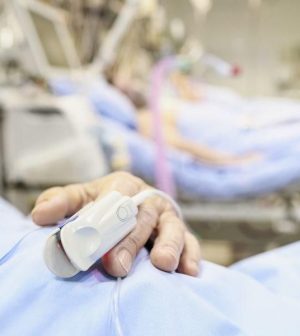- Are You Making This Expensive Thermostat Error This Winter?
- Recognizing the Signs of Hypothyroidism
- 10 Strategies to Overcome Insomnia
- Could Artificial Sweeteners Be Aging the Brain Faster?
- Techniques for Soothing Your Nervous System
- Does the Water in Your House Smell Funny? Here’s Why
- Can a Daily Dose of Apple Cider Vinegar Actually Aid Weight Loss?
- 6 Health Beverages That Can Actually Spike Your Blood Sugar
- Treatment Options for Social Anxiety Disorder
- Understanding the Connection Between Anxiety and Depression
COVID Survivors’ Plasma Might Prevent Worsening Illness in Older Patients: Study

Blood plasma from people recovering from COVID-19 could help prevent severe illness in older patients newly infected with the virus, a small new Argentinian study finds.
The findings give new hope to the notion that so-called “convalescent plasma” might have a role to play in treating COVID-19. Earlier studies had been disappointing, showing the treatment had little effect on people with severe, advanced cases of COVID-19.
But the new trial of 160 patients was conducted in people infected with the new coronavirus who were not yet sick enough to require hospital care. Patients averaged 77 years of age.
In the trial, 80 patients received plasma and 80 received a placebo treatment. According to the study authors, “severe respiratory disease developed in 13 of 80 patients (16%) who received convalescent plasma and 25 of 80 patients (31%) who received placebo.” In other words, the treatment cut in half the likelihood that a patient would go on to require supplemental oxygen to help them breathe, the authors said.
But there were two key factors critical for donor plasma to be effective in curbing illness: It had to be given within 72 hours of the onset of symptoms, and the plasma must have a high concentration of disease-fighting antibodies.
In the study, about 28% of volunteers who’d recovered from COVID-19 and donated their plasma had achieved the high levels of antibodies in their plasma that was needed to produce a medical benefit, the team said.
“The evidence that early administration of convalescent plasma treatment can improve outcomes for COVID-19 patients is important,” said lead investigator Dr. Fernando Polack from the nonprofit health organization Fundación Infant in Buenos Aires.
“There is a paucity of therapies today to prevent progression of mild cases to severe illness and no clear pathway for keeping these patients out of hospitals, where capacity continues to be stretched,” Polack said in a Fundación news release. “Our results provide a roadmap for an early intervention among individuals at higher risk, allowing us to expect a better prognosis for patients while reducing the need for oxygen support and hospitalization.”
One U.S. expert stressed that the treatment still isn’t a remedy for most COVID-19 patients, including the seriously ill.
The study findings “change things for a very small subset of patients,” said Dr. Mangala Narasimhan, who directs critical care services at Northwell Health in New Hyde Park, N.Y.
Patients must be able to access donor plasma within three days of their first symptoms, and that plasma must have a high antibody count. Also, she said, “we do not know the long-term effects of this therapy and if it is durable.”
Narasimhan noted that other treatment options — most specifically, monoclonal antibody therapies (such as the type given to President Donald Trump) — are available. Those treatments “may be a more beneficial treatment overall,” she said, so “head-to-head studies will need to be done to evaluate which therapy has the most benefit.”
Still, Polack’s team noted that “passive immunization” techniques such as convalescent plasma have been used for over a century, most recently during the Ebola, MERS (Middle East respiratory syndrome) and SARS (severe acute respiratory syndrome) outbreaks.
“Effective ways that can be made available quickly to prevent the hospitalization of COVID-19 patients are critical to saving lives because it will take some time for new vaccines to reach everyone who needs them,” Dr. Keith Klugman, director of the pneumonia program at the Bill and Melinda Gates Foundation, a funder of the study, said in the news release.
“In addition to indicating the efficacy of a tool that could be implementable and affordable in lower-income countries, the study provides key insights about the immune response to COVID-19 that could help with development of other medical interventions,” Klugman noted.
The findings were published Jan. 6 in the New England Journal of Medicine.
More information
For more on COVID-19, head to the U.S. Centers for Disease Control and Prevention.
SOURCES: Mangala Narasimhan, DO, SVP, director of critical care services, Northwell Health, New Hyde Park, N.Y.; Fundación Infant, Buenos Aires, Argentina, news release, Jan. 6, 2021; New England Journal of Medicine, Jan. 6, 2021
Source: HealthDay
Copyright © 2026 HealthDay. All rights reserved.










